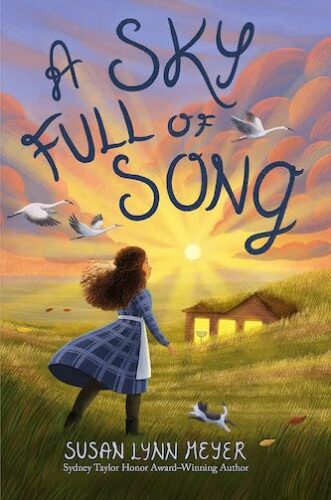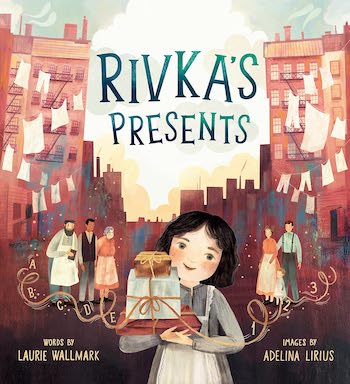Children’s Book Review: Jews in America — From North Dakota to the Lower East Side
By Cyrisse Jaffee
Just in time for Chanukah, here are two books that focus on the Jewish experience in America.
A Sky Full of Song by Susan Lynn Meyer. Union Square Kids, 2023.
Rivka’s Presents by Laurie Wallmark. Images by Adelina Lirius. Random House, 2023.

Aimed at middle-grade readers (ages 8–10), A Sky Full of Song tells a story that may be less familiar than the typical story about Jewish immigrants. Shoshana is 11 years old in 1905, when, along with her mother and three sisters, Libke, Pearlie, and Tsivia, she leaves Ukraine (then part of the Russian Empire) to join their father and brother in North Dakota. Despite the dangers of the journey, it was a time when many Jews left their homelands — and lives marked by poverty and violence, in the form of anti-Jewish pogroms (attacks) — for America.
Shoshana finds her new life strange. Their home is a dugout, deep in the rocky soil of the prairie. Instead of selling cheese, as he did in their shtetl (village), her father is a farmer. He tells her, “I never want to hear again the false things the rest of the world says about Jews. That we live off the work of others. Buying and selling, not making. My whole life … I wanted to work with my hands growing food out of my own land, to show people what a Jew can do.” The narrative easily interweaves the issues that Jewish immigrants dealt with in the early 20th century: discrimination by merchants, bullying at school, and the constant struggle to maintain Jewish laws and customs, including keeping kosher and speaking Yiddish, in a Christian world. Papa reminds Shoshana about why they had to leave: “The harsh restrictions on where we could live, what work we could do, were we could go. The laws keeping Jews from going to school. The boys forced into the army. The Cossacks. The pogroms. The tsar.”
In an interesting, though minor subplot, Shoshona also learns that their “free” land was actually stolen from the Dakota people. Her parents agree that the government’s action was wrong and that forcing the Dakota onto a reservation was not a just solution. Later, she meets a Dakota girl and her brother in town; unfortunately, the scene feels contrived. Still, it’s an important aspect to include in the story. (A new book for adults by Rebecca Clarren, The Cost of Free Land: Jews, Lakota, and an American Inheritance, explores a similar situation experienced by her family in South Dakota.)
Although some of her schoolmates are kind, others are not. She is called a “kike,” a “yid,” and roughed up. Even the friendlier girls insist that Jews killed Jesus, as they’ve learned in Sunday school, then suggest that Shoshana might be excused because she doesn’t “seem” very Jewish and doesn’t have a “Jewish nose.” Shoshana expresses the conflicts that many immigrants feel. “Was it wrong,” she wonders, “that I didn’t want to feel different all the time? That I didn’t want to feel afraid, somewhere far in the back of my mind, every single day?”
The story culminates in December, when Shoshana must decide how she will participate in the seasonal school concert. She wants to blend in, even to the point of singing a Christmas carol. But Libke, her older sister, is appalled. Her message to Shoshana: “Being ashamed of your people is like being ashamed of yourself.” How Shoshana resolves her feelings, plus her actions during a blizzard, when she rescues the worst of the schoolyard bullies, makes the ending satisfying without being cloying. An author’s note provides more historical context, recommended websites, and a list of sources she consulted while writing the book. Although most of the Yiddish is explained in context within the narrative, one wishes for a Yiddish-English glossary that would help readers pronounce the words and phrases and/or check their meaning.

Rivka’s Presents, a beautifully illustrated picture book to read aloud, covers more traditional territory, yet it is both charming and fresh. The story is set in the Lower East Side in New York in 1918. Young Rivka is excited about her first day of school, but she is disappointed to learn that, because of her father’s illness, her mother must go to work at the shirtwaist factory. Rivka will have to delay schooling to take care of her little sister, Miriam.
Undaunted, Rivka negotiates a deal with Mr. Solomon, the grocery store owner, to teach her to read. In exchange she helps to clean the store (with Miriam in tow). In the fall, she asks Mr. Cohen, the tailor, to teach her arithmetic. In return, Rivka helps with deliveries. In the winter, she learns along with her neighbor, Mrs. Langholtz, who is studying American history so that she can become a citizen. When spring comes, Papa is finally well enough to go back to work. To celebrate, the neighbors bring Rifka gifts to help her get ready to finally start school.
The story takes place during a pivotal year for many Americans, when the global flu epidemic killed millions of people around the world. Some, like Rivka’s father, survived but were often ill for many months. Adelina Lirius’s lovely gouache and colored pencil illustrations serve up an urban landscape that’s a little too clean and tidy, but they capture both the time and setting in a lively, appealing style. There is a real sense of community evoked here. Rivka’s deep desire for education — coupled with her industrious, hard-working spirit — makes this a loving tribute to those who forged a new path for the following generations. An author’s note provides more information about the period. A small glossary and definitions of Yiddish words are also included.
Cyrisse Jaffee is a former children’s and YA librarian, children’s book editor, and a creator of educational materials for WGBH. She holds a master’s degree in Library Science from Simmons College and lives in Newton, MA.
Tagged: A Sky Full of Song, Chanukah, Jewish culture, Laurie Wallmark, Rivka Presents
